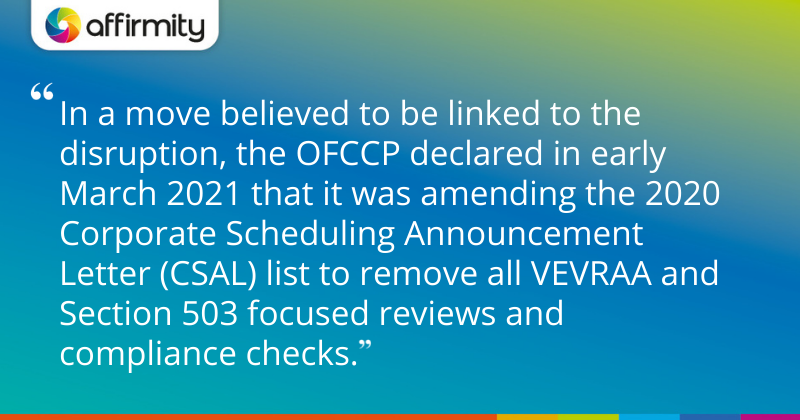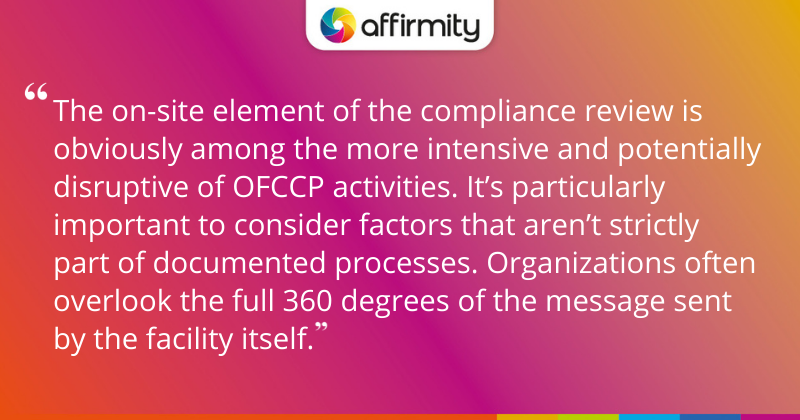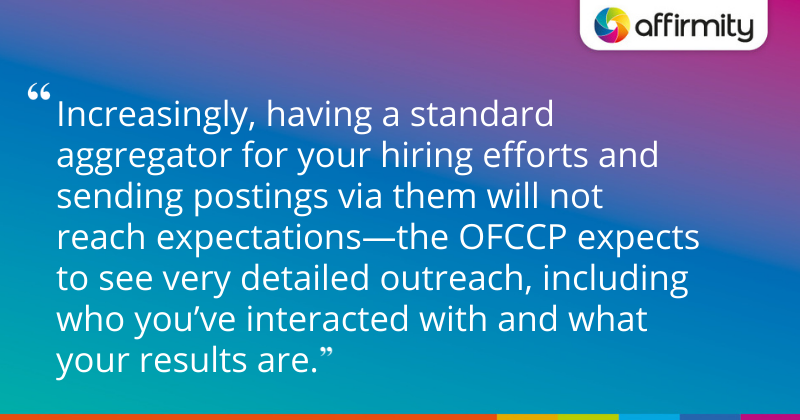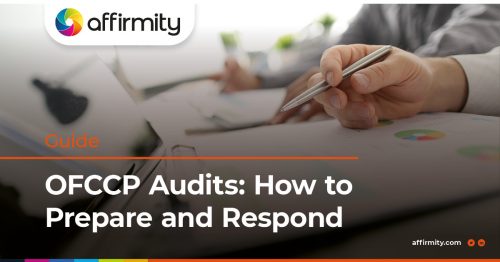OFCCP audits take several different shapes and forms: due to recent events, a number of formats have been shelved to allow compliance officers to adjust to a growing backlog. Read on to find out the current ways in which you can anticipate being audited by the OFCCP, and some key tips on what to expect.
The Current State of Play: OFCCP Auditing in 2021 and Beyond
COVID-19 has presented challenges for organizations of many kinds, and the OFCCP was not immune to the disruption caused. Remote working has not only disrupted the OFCCP’s own operations internally, but the on-site component of many audit activities has been paused in consideration of social distancing rules.
In a move believed to be linked to the disruption, the OFCCP declared in early March 2021 that it was amending the 2020 Corporate Scheduling Announcement Letter (CSAL) list to remove all VEVRAA and Section 503 focused reviews and compliance checks. This will free up officers to look at Corporate Management Compliance Evaluation (CMCE), Functional Affirmative Action Program evaluations (FAAP), and establishment-based compliance reviews.
This is only anticipated to be a temporary measure, with the three paused review types likely to return in an upcoming cycle. Furthermore, it’s important to understand and prepare for compliance with these review types. Indeed, more detailed questioning on Section 503 and VEVRAA issues is expected within the other review types. Whether practices such as the increased use of conference calls rather than on-site visits continue beyond the pandemic period remains to be seen.
FURTHER READING | ‘OFCCP Audits: Why You Should Retain and Analyze Job Seeker Data for Audit Purposes’

What Are the Different Types of Audits and Focused Reviews?
There are six main types of OFCCP audit that your organization can be scheduled for, requiring different degrees of detail. Some are specific to certain protected characteristics or areas of your organization, though all will require prioritization and attention to detail.
1) Compliance Check
Considered the most streamlined, least impactful, and least intrusive type of audit, a compliance check involves:
- Ensuring the contractor has maintained records consistent with Executive Order 11246, Section 503 of the Rehabilitation Act, and the Vietnam Era Veterans’ Readjustment Assistance Act (VEVRAA)
- Data from your current year plan, and results from the prior year
- A review of job advertisements and examples of reasonable accommodations for persons with disabilities
A compliance check is a comparatively low maintenance OFCCP activity requiring a small amount of effort on the part of the organization being audited. Due to pandemic-based disruption, this activity was not required by the 2020 CSAL.
2) Compliance Review

Arguably the most familiar of the OFCCP’s activities, in which organizations will receive a scheduling letter with 22 items to address. A compliance review involves the following:
- A detailed look at your current written program alongside consideration/review of your long-term results
- In a small minority of cases, an organization can receive a closure letter after their initial submission, if the OFCCP doesn’t intend to continue the investigation
- The more likely scenario will involve the OFCCP taking the opportunity to request some additional information based on its initial findings. This may involve a request to come on site, which will be a more detailed process.
- After the on-site visit, it may follow up with additional questions
- Its findings will follow once it has obtained all information you’re able to provide
The on-site element of the compliance review is obviously among the more intensive and potentially disruptive of OFCCP activities. It’s particularly important to consider factors that aren’t strictly part of documented processes. For example, while it’s standard practice to set up an area in the facility in which the OFCCP officer can work through the requested documentation, organizations often overlook the full 360 degrees of the message sent by the facility itself. Prior to the officer’s arrival, it makes sense to review whether:
- All compliance-related posters in your facility are updated
- Access points adequately accommodate individuals with disabilities
- Accessible parking spaces are easily identified and fit for purpose
MORE ON AAP OPPORTUNITIES | ‘6 Ways to Advance Your AAP Beyond Compliance’
3) Section 503 Focused Review
Section 503 of the Rehabilitation Act of 1973 is a law prohibiting federal contractors and subcontractors from discriminating in employment against individuals with disabilities. It also enforces taking affirmative action with regards to these individuals. If you’re subject to a Section 503 focused review, the OFCCP will:
- Conduct interviews with managers responsible for equal employment opportunity and Section 503 compliance as well as employees affected by those policies
- Consider hiring and compensation data, and accommodation request handling
- Usually conduct an on-site review as part of the process
Increasingly, having a standard aggregator for your hiring efforts and sending postings via them will not reach expectations—the OFCCP expects to see very detailed outreach, including who you’ve interacted with and what your results are. Due to pandemic-based disruption, this activity was not required by the 2020 CSAL. However, its requirements remain an important consideration for future cycles and are considered to the same degree in compliance reviews.
4) VEVRAA Focused Review

Functionally similar to the above, but with a focus on Veterans via the Vietnam Era Veterans’ Readjustment Assistance Act (VEVRAA) and lacking an automatic on-site component. Again, due to pandemic-based disruption, this activity was not required by the 2020 CSAL but remains important.
5) Corporate Management Compliance Evaluation (CMCE)
Colloquially known as the “glass ceiling” audit, it’s important for organizations to understand that the CMCE is not just about the makeup of your organization (i.e. your current demographics).
Critically, it also considers the way people are able to move into senior roles—your feeder pools, how people move within your organization, and their advancement opportunities. Expect your OFCCP officer to pay special attention to components of your employment process that affect advancement or promotion into mid-level and senior-level positions.
ALSO ON THE BLOG | ‘How to Connect Your Pay Reporting Requirements to Your Pay Equity Efforts’
6) Functional Affirmative Action Program Evaluation (FAAP)
FAAP evaluations are similar to regular compliance reviews, but only consider employers who have applied and subsequently been approved for Functional Affirmative Action Program agreements with the OFCCP.
OFCCP Audits: How to Prepare and Respond—Continue Reading
This run-down of current OFCCP auditing practices opens our guide ‘OFCCP Audits: How to Prepare and Respond’. Download the full guide and keep reading analysis from our experts on:
- Our top seven lessons learned through years of helping clients submit their responses to the OFCCP
- A round-up of frequently asked questions that drill into some specific scenarios and common concerns
- What you should be doing all year-round to prepare for future audits
- What to do when you’re notified of an audit, and everything you should pull together before your final submission
- Practical and useful tools and template documents that will help you manage the process
Download the full guide today.

